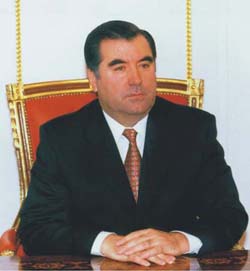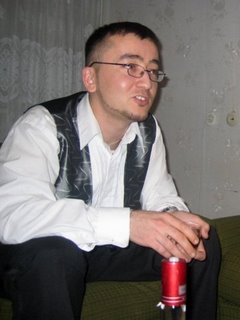
Few days ago I got back from my boring night shift early in the morning and obviously could not go to bed straight away; sunrays were too beautiful to ignore. Opened my lap-top and started chatting with Esfandiar in Dushanbe who was trying to begin his working day, but found himself under numerous annoying questions of a sleepless buddy far away in Prague.
Apparently he had talked to a couple of Social Democrats about the 2003 Constitutional Amendments and their impact on the incumbent president. He opened my eyes to a terrific fact that visibly demonstrates illegitimacy of Emamali Rahmanov’s candidacy in the forth-coming election.
We had talked about it with Rahmatollah Zaerov (the leader of Social Democrats) so many times before at the BBC, but his answers were too vague to clarify what was happening indeed. But I knew that Zaerov’s position had shaken up the government on those days. It was a couple of years ago. Zaerov was widely ignored by the local media and the government; he himself finished up at a hospital bed with a stroke. However, after I started studying the case with Esfandiar’s help, a horrible picture started unfolding:
Following a national referendum in Tajikistan in 2003, where we were supposed to approve or disapprove 56 constitutional changes at once, it was announced that Emamali Rahmanov had been allowed to run for another two terms – in 2006 and 2013. But there is a chapter called “Transitional regulations” at the bottom of the very Constitutional Amendments and one of its paragraphs reads (word by word):
“3. Presidential elections for two successive terms, stipulated by fourth part of Principle 65, begin upon termination of powers of the operating President.”That means Rahmanov is not allowed to run for another term until his presidential powers are in force. Question: When do they terminate actually, these “presidential powers”? Principle 67 of the Tajik Constitution sheds some light:
“Powers of the President terminate after the swearing-in of the new president-elect.”That means the amendments do not have the force of law until Rahmanov is in power. And he has to step down only after a new president swears into office. Inevitably a new president has to be chosen first, before Rahmanov leaves. He’s served two presidential terms already and has no right to run for president again.
Today Rahmatollah Zaerov stipulated his allegations for me again. Before him Shakerjan Hakimov was telling me the same. However, OSCE’s first interim report on Tajik presidential election (12 October 2006) tells us something else:
“As a result of this referendum (2003), the current president – first elected president in 1994 and re-elected in 1999 – is allowed to run for another two terms in 2006 and 2013.”I gave a call to Urdur Gunnarsdottir, OSCE/ODIHR’s spokesperson in Warsaw and shared with her Tajik opposition’s concern over the legitimacy of Rahmanov’s candidacy. She had to look for some appropriate words to answer and finally she said: “OSCE is not a court and will not be issuing legal verdicts; if there is a legal problem in different interpretations of the law, the question must be considered by a court.”
While Zaerov and Hakimov say, there is no independent court in Tajikistan and the issue could be put on UN’s desk only. Zaerov intends to do it after the election, if his shaky health condition would allow him.
Now I need an international lawyer who could give me an unbiased expert view to scrutinize this ostensibly appalling breach of law on higher levels.



